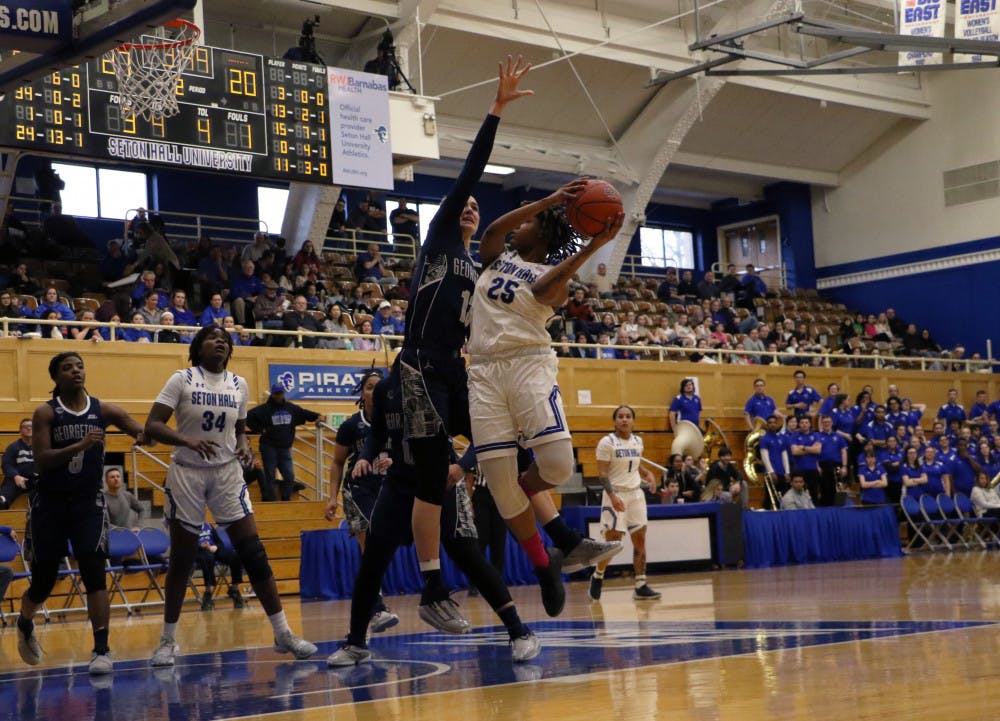The Archdiocese of Newark has expressed concerns with Seton Hall offering a special topics course on gay marriage next fall.
The class, which will be taught by W. King Mott, will explore the issue of gay marriage from an academic perspective, Mott said.
"The class is not about advocacy, but about studying the issue from an academic perspective. It's about awareness," Mott said in a previous Setonian article.
Jim Goodness, director of communications at the archdiocese, told EWTN News that the archdiocese was unaware of the course offering.
He was quoted as saying the decision to offer the class is "troubling."
"The Church teaches – and has continued to teach for two millennia – that marriage is a union of man and woman, reflecting the complementarity's of the sexes. That teaching precedes any societal connotation of marriage, and is based on natural law," Archbishop John J. Myers said in a statement. "This proposed course seeks to promote as legitimate a train of thought that is contrary to what the Church teaches. As a result, the course is not in synch with Catholic teaching."
Seton Hall's Board of Trustees, which Archbishop Myers is chairman of, has requested the Board of Regents investigate the course.
Although it has been reported by the Newark Star-Ledger that Seton Hall's governing board is debating canceling the class, Mott said the class is still scheduled to run in the fall.
Jeffrey Togman, chairman of the department of political science, said the class is of a special topics nature and is being taught from a political theory perspective.
Special topics courses "generally explore an important political or social topic," according to Larry Robinson, vice provost of the university, as reported by EWTN News.
According to Togman, special topics classes may be taught up to three times before submission to a college-wide educational policy committee is required.
Although the class on gay marriage is contrary to Catholic teachings, Mott was not informed that his course had to adhere to religious principles as set forth by the university.
According to the American Association of University Professors' 1940 Statement of Principles on Academic Freedom and Tenure, "limitations of academic freedom because of religious or other aims of the institution should be clearly stated in writing at the time of the appointment."
"I have never been notified of any limitations, nor, to my knowledge, have any faculty members," Mott said.Mott was also asked for a syllabus early, although the faculty guide states that a professor is not required to provide a syllabus until the end of the first week of classes.
Mott said he did not provide a syllabus despite the request, and that he would provide a syllabus to his department one week prior to classes "just as in every other instance."
EWTN News also reported the vice provost said he anticipates that the Catholic position on same-sex marriage will be "robustly explored."Robinson could not be reached for comment.
"My impression is that Dr. Robinson is reflecting upon what is true about all academic classes," Mott said. "Ideas are explored."
Mott said he does feel the class is being singled out; however, it is "natural" given the subject matter.
Togman did not agree that the course was being singled out.
"Our department embraces both the Catholic mission of the University and the principles of academic freedom," Togman said in a follow-up e-mail. Mott said other classes have not been required to advocate Catholic teachings.
"Scientist, social scientist, poet, writer, theologian… no professor is required to adhere to any ideology," Mott said. "We are obliged to ethical use of information and a high level of professionalism."
Seton Hall's offering of the course has been widely publicized. The Newark Star-Ledger, NJ.com and the Huffington Post have all featured articles on the issue. As a result, Mott has received some "unkind" letters and phone calls.
"It is my experience that these individuals are terribly afraid of something," Mott said.
However, despite the backlash, Mott said he has received more support than opposition.
When asked about his thoughts on the subject, Vice-Chair of The Faculty Senate David Beneteau spoke for himself and not the senate. "It is regrettable that there would be any objection to students being exposed to free academic discourse on campus," Beneteau said.
Jessica Sutcliffe can be reached at jessica.sutcliffe@student.shu.edu.





